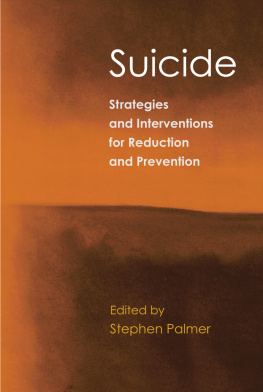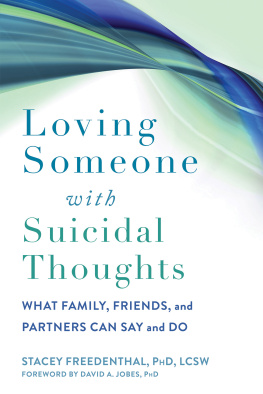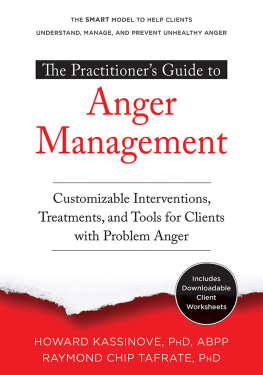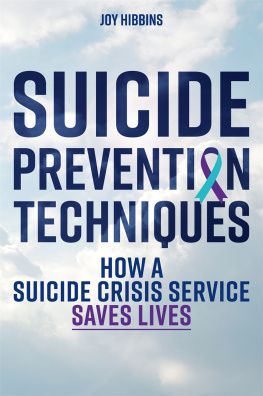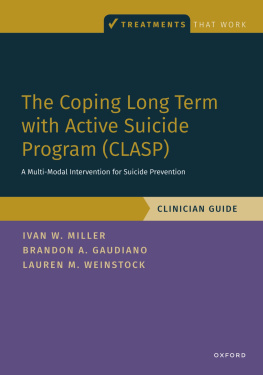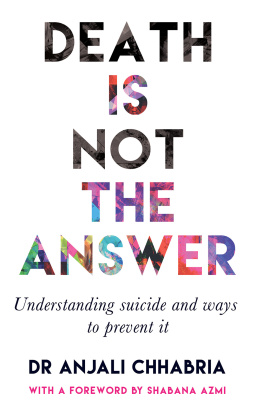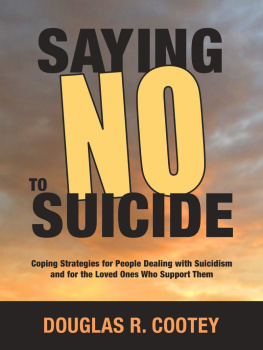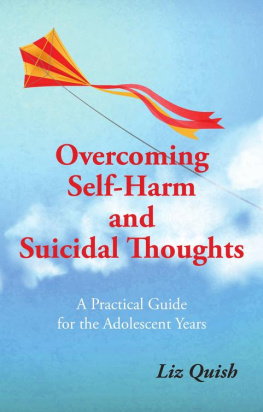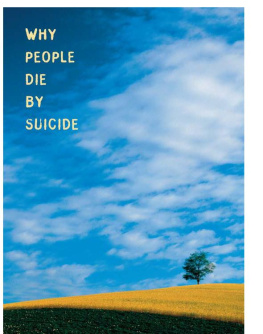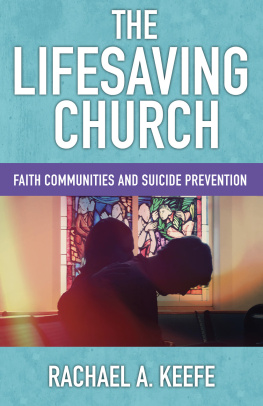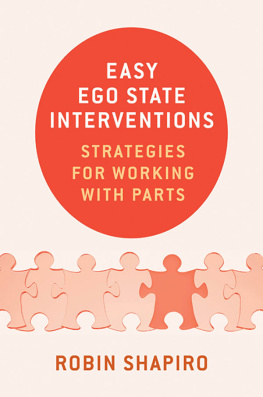
Suicide
All practitioners working in the caring and helping professions face many challenges and questions when dealing with suicidal clients: is this client being serious? Can I do more? What should I do? Should I refer on? Should I break confidentiality? Have I assessed this client correctly? Both experienced practitioners and trainees wish to have more knowledge about assessing and dealing with suicidal clients.
Suicide: Strategies and Interventions for Reduction and Prevention examines myths about suicide, explores facts and statistics at national and international levels, and uses client cases to uncover thoughts leading to suicidal behaviour. The editor offers an insight into what can be done in the community, and within therapeutic settings when working with this challenging client group. Contributions are divided into four parts covering:
suicide: statistics, research, theory and interventions
personal experience of suicide
three therapeutic approaches to prevent suicide
group interventions.
Featuring chapters from a range of experienced practitioners, this book provides a wealth of information on strategies and possible interventions. The addition of a Self-Harm Management Plan, assessment checklists, and list of useful organizations makes it essential reading for both mental health professionals, and those in training.
Suicide
Strategies and interventions for reduction and prevention
Edited by Stephen Palmer

First published 2008 by Routledge
27 Church Road, Hove, East Sussex BN3 2FA
Simultaneously published in the USA and Canada
by Routledge
270 Madison Avenue, New York, NY 10016
Routledge is an imprint of the Taylor & Francis Group, an Informa business
2008 Selection and editorial matter, Stephen Palmer; individual chapters, the contributors
Typeset in Times by RefineCatch Limited, Bungay, Suffolk Printed and bound in Great Britain by TJ International Ltd, Padstow, Cornwall
Paperback cover design by Jim Wilkie
All rights reserved. No part of this book may be reprinted or reproduced or utilized in any form or by any electronic, mechanical, or other means, now known or hereafter invented, including photocopying and recording, or in any information storage or retrieval system, without permission in writing from the publishers.
This publication has been produced with paper manufactured to strict environmental standards and with pulp derived from sustainable forests.
British Library Cataloguing in Publication Data
A catalogue record for this book is available from the British Library
Library of Congress Cataloging-in-Publication Data
Suicide : strategies and interventions for reduction and prevention / edited by Stephen Palmer.
p. ; cm.
Includes bibliographical references and index.
ISBN 9781583919941 (hbk.) ISBN 9781583919958 (pbk.). 1. Suicide. 2. Suicidal behavior. 3. SuicidePrevention. 4. SuicidePsychological aspects. I. Palmer, Stephen, 1955[DNLM: 1. Suicide. 2. Psychotherapymethods. 3. Suicideprevention & control. WM 165 S9485 2007]
RC569.S9369 2007
362.28dc22
2007007860
ISBN: 9781583919941 (hbk)
ISBN: 9781583919958 (pbk)
To RH
Contents
STEPHEN PALMER
PART I
Suicide: statistics, research, theory and interventions
STEPHEN PALMER
STEPHEN PALMER
CAMERON STARK
NOEL SHEEHY AND RORY C. OCONNOR
PETER RUDDELL AND BERNI CURWEN
PART II
Personal experience of suicide
SUSAN WALEN
DAVID COOKE
ANOPAMA KAPOOR
PART III
Three therapeutic approaches to prevent suicide
WAYNE FROGGATT AND STEPHEN PALMER
JOHN LEES AND QUENTIN STIMPSON
JOHN SHARRY, MELISSA DARMODY AND BRENDAN MADDEN
PART IV
Group interventions
MINNA PIETIL
MONIQUE SGUIN, GINETTE GOULARD, YVONNE BERGMANS AND PAUL S. LINKS
STEPHEN PALMER
PART V
Appendices
Figures
Tables
Notes on the editor and contributors
Stephen Palmer, PhD, is Honorary Professor of Psychology and Director of the Coaching Psychology Unit at City University, London, and Director of the Centre for Stress Management, London. He is Honorary President and Fellow of the Association for Coaching, Honorary Vice-President of the Institute of Health Promotion and Education, Honorary Vice-President of the International Stress Management Association (UK), a director of the Association for Rational Emotive Behaviour Therapy and Consultant Director of the New Zealand Centre for Cognitive Behaviour Therapy.
He was the first chair of the British Psychological Society Special Group in Coaching Psychology for 20042005, and was chair of the Scientific Awards Committee of the British Psychological Society Division of Counselling Psychology from 1997 to 1999. He is co-editor of The Rational Emotive Behaviour Therapist, editor of the International Journal of Health Promotion and Education and UK coordinating editor of the International Coaching Psychology Review.
He was the academic consultant on the Surrey Police Deepcut Investigation Final Report and in April 2004 he was appointed as a specialist advisor to the House of Commons Defence Select Committee on the Duty of Care Inquiry into the initial training establishments in all three services of the armed forces. He is a member of the International Association for Suicide Prevention and the American Foundation for Suicide Prevention. He is an award-winning psychologist and psychotherapist.
Yvonne Bergmans is the suicide intervention consultant at the Arthur Sommer Rotenberg Chair in Suicide Studies in Toronto, Canada. She has developed and continues to coordinate and facilitate intervention groups for individuals who are at high risk for suicide.
David Cooke has a BA in Business and Management from Northumbria University, UK. He spent his childhood in a small Cornish town and is currently living in London working as a property consultant.
Berni Curwen works at the Primary Care Counselling and Psychology Department, Dartford, Kent, as a UKCP registered psychotherapist. She is co-author of Brief Cognitive Behaviour Therapy (2000, with Stephen Palmer and Peter Ruddell).
Melissa Darmody is a counselling psychologist with a doctorate in counselling psychology. She has developed employee assistance programme (EAP) services since 1997 in Ireland and other countries and has particular expertise in working with victims of abuse and trauma. She has written several articles incorporating solution-focused brief therapy into work with adult survivors of abuse and trauma. She is the clinical director of an EAP based in Ireland.
Wayne Froggatt, Dip.Soc.Wk, CQSW, MANZASW, Certified REBT Supervisor, Executive Director, New Zealand Centre for Rational Emotive Behaviour Therapy and Centre for Cognitive Behaviour Therapy, Consultant Director, UK Centre for REBT, is the author of Choose to be Happy, GoodStress, FearLess, Relaxation for the Real World, The Rational Treatment of Anxiety, Learning to use Rational Emotive Behaviour Therapy, Learning to use Cognitive-Behaviour Therapy.
Ginette Goulard, MD, FRCP(C), is Director of Education, Centre Hospitalier Pierre-Janet, Gatineau Assistant Professor, Department of Psychiatry, University of Ottawa, Canada.
Anopama Kapoor is a chartered counselling psychologist, registered with the British Psychological Society. She trained at City University, London, and has worked with people suffering from a range of mental health problems, for many years. She has also worked as a tutor for City University.
Next page
